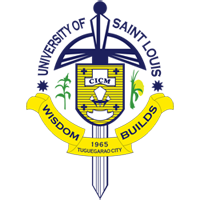
Outcomes-based education (OBE) work texts yield to positive student achievement in Solid Mensuration, a Scopus indexed article from researchers in the University of Saint Louis reveals.

The study titled, “Improving Engineering Students’ Achievement in Solid Mensuration by Using an Obedized Work Text,” used quasi-experimental method involving 50 students equally divided into control and experimental groups, the latter having used the work text.
“Some lessons in Solid Mensuration are too complicated to analyze, so it is difficult for the students to understand the subject,” the researchers rationalized their study, pointing out the application of mensuration in engineering projects particularly three-dimensional objects.
The post-test scores of the experimental group were significantly higher than those of the control group.
“The obedized work text allowed the students to investigate, explore and discover concepts on their own through Concept Development which is one feature of the work text. There are also activities such as Guided Practice which serves as an approach to instruction where the teacher leads the activity but solicits help from students; Self-Test which consists of items for additional drills and practice; and Evaluation which is given to assess students’ learning,” said lead author and researcher Dr. Erovita Teresita B. Agustin, assistant professor of Mathematics in the School of Engineering, Architecture, Interior Design, and Information Technology Education.
“Obedized work text is an instructional material in Solid Mensuration that is carefully developed for engineering students. It is a material which is focused on the task to be learned and accomplished by the students,” added Dr. Agustin.
The obedized work text was developed by the lead researcher with suggestions from 3 Mathematics instructors, 3 Engineering Sciences instructors, and 3 external experts.
Meanwhile, the pre-test and post-test of each of the groups showed significant difference with the post-test higher after the use of work text and textbook.
“The obedized work text was utilized by the experimental group for the duration of 33 hours for a total of 22 meetings. The control group was taught using the textbook in Solid Mensuration for the same duration. Throughout this period, the lessons, references through internet sites for additional information, and learning conditions were the same for both groups. Parallel items in the quizzes and assignments were administered,” explained Dr. Agustin.
The pre-test and post-test were conducted during the Summer Term of school year 2015-2016 in two Solid Mensuration classes at the University of Saint Louis.
“The work text is considered obedized because activities provided in the material allow students to develop their higher-order cognitive skills through investigation, exploration and discovery,” Dr. Agustin noted.
“The textbook utilized by the control group is not obedized. Exercises are limited and solutions are already presented to students.”
“The application of the obedized work text in teaching Solid Mensuration is effective in improving engineering students’ achievement in the course. It is recommended that Mathematics instructors teaching Engineering are encouraged to develop their own instructional materials to facilitate better teaching and learning,” Dr. Agustin and co-author Dr. Darin Jan Tindowen, Graduate School Research professor and head of the Center for Social Innovation, Local Knowledge, and Educational Research (CSILKER), concluded in their research paper.
The study appears in Global Journal of Engineering Education, Volume 21, Number 1, 2019.
Dr. Agustin received from the Commission on Higher Education a grant for her dissertation at Saint Paul University Philippines; Dr. Tindowen assisted in the journal publication of the research.
With the change in the curriculum of the engineering programs, Solid Mensuration is no longer offered effective SY 2018-2019; however, the work text was used as a reference for the BS Architecture program during the first semester of same school year.

